

After
he
stopped
being
a
mujahid
during
the
Soviet-Afghan
War
but
be
-
fore
becoming
the
most
wanted
ter
-
rorist
after
the
9/11
attacks,
Osama
Bin
Laden
detoured
through
the
Balkans.
He
traveled
to
Albania,
built
an
alliance
with
the
mujahideen
in
the Bosnian War (…)
Islamic Radicalism in the Balkans:
From Immigrant Arab Fighters to
Emigrant Combatant in Arabia





By: Julian Schmid
The “War on Terror” Did Not Take
Place: “9/11,” Ahistoricity, and the
Infinite Apocalypse
By: Jan Daniel
Myopic Visions of the War on
Terror Era: Lebanon as a Post-9/11
Security Problem
After
it
was
revealed
that
seventeen
of
the
nineteen
9/11
hijackers
hailed
from
the
Gulf
(fifteen
were
Saudi
citizens,
two
were
Emiratis),
the
states
of
the
Gulf
Cooperation
Council
(GCC)
doubled
down
on
rhetoric
about
the
need
to
combat
radical
and
militant
Islam.
Washington also (…)
9/11 and the Securitization of
Political Islam in the Gulf
The
events
of
9/11
and
the
subsequent
Global
War
on
Terrorism
have
profoundly
transformed
the
landscape
of
international
development
in
post-Soviet
Central
Asia.
The
launching
of
the
military
campaign,
Operation
Enduring
Freedom,
in
neighboring
Afghanistan
in October 2001 resulted in
By:
Clément Steuer
How 9/11 Reshaped the
International Development
Scene in Central Asia
US Pressure for
Democratization, and Egyptian
Political Opportunity Structure
since 9/11




The
terrorist
attacks
of
9/11
drastically
impacted
the
lives
of
Uyghurs
and
other
Muslims
in
China’s
Xinjiang
region.
But
while
the
ensuing
Global
War
on
Terror
and
worldwide
Islamophobia
has
likely
been
a
contributing
factor
to
China’s
repression (…)
By: Ondřej Klimeš and Sam Tynen
Assimilation or Islamophobia?:
Uyghurs and China’s
Counter–Terrorist Discourse
after 2001

By: Courtney Freer
The
terrorist
attacks
of
9/11
on
American
soil
altered
not
only
the
international
security
environment
but
also
the
domestic
power
equilibrium
in
several
Southeast
Asian
countries.
The
incumbent
Malaysian (…)
Keeping Watch: Islamism in
Indonesia after 9/11 and the
Bali Bombing of 2002

By: Tomáš Petrů
At
the
very
outset
of
the
21st
century,
Osama
bin
Laden
positioned
himself,
wittingly
or
unwittingly,
with
the
9/11
attacks,
as
one
of
its
likely
most
important
figures.
The
attacks
initially
served
to
undermine
multicultural
policies
in
relatively
ethnically and religiously (…)
Bin Laden’s Legacy Probably
Surpasses His Wildest Dreams

By: James M. Dorsey
By: Karolina Kluczewska

With
the
20th
anniversary
of
the
September
11th
attacks
upon
us,
it
is
important
to
recall
that
millions
of
Arab
and
Muslim
Americans,
who
had
nothing
to
do
with
those
attacks,
suffered
enormous
civil
rights
violations,
physical
attacks,
job
losses
(…)
By: Louise Cainkar
Surveillance Spotlight on Arab
and Muslim Americans: An
Enduring Legacy of the Global War
on Terror

By: Asya Metodieva
When
al-Qaeda
framed
the
9/11
attacks
as
an
Islamic
holy
war
(jihad)
and
the
United
States
retaliated
by
invading
Afghanistan
(2001)
and
Iraq
(2003)
and
initiating
a
Global
War
on
Terror,
Samuel
Huntington’s
clash
of
civilizations
thesis
between
"Islam"
and "the West" gained currency (…)
The Rise and Fall of Moderate
Islamism as a Political Project:
The Legacy of 9/11 in
Turkey’s Relations with the West
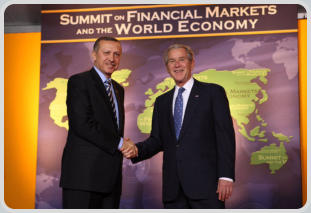
By: Pelin Ayan Musil
The Evolution of Armed Drones
for Targeted Killing after 9/11

From
Yemen
to
Libya,
Syria,
and
Nagorno-Karabakh,
armed
drones
delivering
precision
munitions
or
commercial
drones
re-engineered
into
flying
bombs
by
insurgents
are
changing
the
security
landscape.
The
Middle (…)
By: Alessandro Arduino
For
the
past
twenty
years,
the
September
11
attacks
have
been
seen
by
American
and
international
policymakers
and
populations
alike
as
a
breaking
point
of
international
poli
-
tics and security. After the (…)
Following
the
9/11
attacks,
the
Bush
administration
launched
the
U.S.
and
its
allies
into
a
“Global
War
on
Terror,”
designed
and
inspired
by
a
neo-conservative
worldview.
The
purpose of the (…)
The
Global
War
on
Terror
(GWOT)
defined
Western
engagement
with
many
places
in
the
Global
South
over
the
last
two
decades.
Trying
to
deal
with elusive terrorist (…)
By:
Daniel R. Mahanty
The Sorcerer’s Apprentice:
U.S. Security Assistance after
9/11

Few
images
better
reflect
America’s
response
to
the
attacks
of
9/11
as
well
as
Goethe’s
The
Sorcerer’s
Apprentice.
Charged
with
mopping
the floor, and eager (…)
On
a
hillside
about
an
hour
outside
of
Kathmandu
sits
a
collection
of
well-
built,
freshly
painted
houses.
The
development
is
not
in
a
particularly
wealthy
area,
but
houses
men
who
have
made
their
money
by
spending
(…)
How the “Forever Wars” Reshape
Himalayan Villages

By: Noah Coburn
The
Global
War
on
Terror
(GWOT)
re
-
shaped
one
of
the
most
consequen
-
tial
intra-Islamic
conflicts
of
our
time,
namely
Sunni-Shi‘i
sectarianism.
While
the
20th
century
had
wit
-
nessed
some
sincere
efforts
to
bridge
the
gaps
between
the
communities,
it became (…)
Bold Shi'is, Frightened Sunnis, and
the Making of Sectarianism after
9/11

By: Simon Wolfgang Fuchs
By: Olmo Gölz
Productive Discomfort: German
Islamic Studies after 9/11

The
events
of
9/11
shook
up
Islamic
Studies
(‘Islamwissenschaft’)
in
the
German-language
academy
(includ
-
ing
Switzerland
and
Austria)
and
left
a deep imprint on the discipline (…)
Afghanistan
was
already
in
the
back
of
my
mind,
on
the
morning
of
September
11,
2001:
I
was
supposed
to
be
there.
As
I
walked
to
my
office
on
a
crystal-clear
Fall
day,
I
was
thinking
about
my
cancelled
visit.
I
barely
noticed
the
plume
of
smoke
from across the (…)
The Global War on Terror and
U.S. Relations with the Muslim
World: Reflections on
Afghanistan

By: Jonah Blank
In
1991,
the
Soviet
Republics
of
Central
Asia
—
including
Kazakhstan,
Kyrgyzstan,
Uzbekistan,
Tajikistan,
and
Turkmenistan
—
suddenly
and
unexpectedly
gained
independence
from
the
Soviet
Union.
The
international
community,
however,
paid little (…)
By: Tim Epkenhans
Post-Soviet Central Asia after
9/11: The Global War on Terror,
Authoritarian Consolidation,
and Religious Revival

War and State (Un)making in
Tribal Borderlands of Pakistan
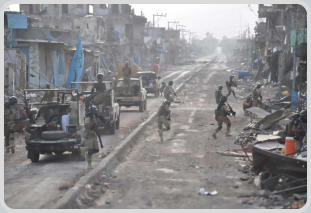
In
August
this
year,
three
soldiers
from
the
gendarmerie
Balochistan
Levy
Force
were
killed
in
a
landmine
explosion
in
Ziarat,
a
southwestern
town
of
Pakistan.
A
parlat
(sit-in)
ensued
as
the
deceased's
relatives
and well-wishers refused (…)
By: Saifullah Nasar
Before
the
9/11
tragedy
struck
American
soil,
U.S.
facilities
in
the
Persian
Gulf
region
were
placed
on
a
heightened
state
of
alert,
as
U.S.
au
-
thorities
were
informed
that
“American
citizens
abroad
may
be
tar
-
geted
by
extremist
groups
with
links
to bin Laden’s organisation (…)
How the Sands Have Shifted:
Reflections on 9/11 as a Chapter
in U.S.-Gulf Relations

By: Clemens Chay
Days
before
the
U.S.-led
forces
in
-
vaded
Afghanistan
to
avenge
the
at
-
tacks
on
9/11,
President
George
W.
Bush
outlined
his
approach
to
the
Global
War
on
Terror
(GWOT):
“Our
war
on
terror
begins
with
al-Qaeda,
but
it
does
not
end
there.”
What
fol
-
lowed was a worldwide (…)
Iran’s Exclusion and Lost
Opportunities in the U.S.-Led
Global War on Terror

By: Asif Shuja
By: Elena Fellner
Redefining Terrorism: Iran, the
U.S., and the War on Terror

Mohammad
Javad
Zarif
likes
to
lecture.
That
much
is
obvious
to
anyone
who
has
ever
read
more
than
a
handful
of
tweets
by
Iran’s
previous
foreign
minister
(2013-2021),
and
it
is
especially striking (…)
By: Angeliki Coletsou
Visual Representations of Iran
in Western Media after 9/11

The
year
2001
has
been
considered
a
turning
point
in
the
rapid
increase
of
Islamophobia
and
Islamophobic
de
-
pictions
in
Western
media,
especially
concerning Arab and Muslim (…)
Departing
from
the
general
trend
in
scholarly
inquiries
and
popular
inves
-
tigations
of
the
post-9/11
era
that
focus
on
the
political,
legal,
religious,
and
social
positionality
of
Muslims
vis-à-vis
the
West,
political
institu
-
tions in their home (…)
9/11 and Sectarianism in Islam;
Counter-Terrorism Debates
among Muslim Groups of Kerala,
India

By: M Sihabudheen Kolakkattil
America Won the War on Terror,
and Everyone is Worse Off
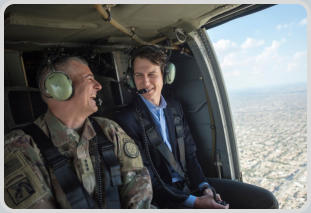
American
elites
talk
about
the
War
on
Terror
as
a
failure.
Whether
their
diagnosis
was
an
overabundance
of
compassion
or
brutality,
goals
that
were
too
ambitious
or
too
limited,
the
U.S.
political
class
tends
to
see
their country’s twenty-year (…)
By: Matthew Petti
From Horse Soldiers to Hybrid
Conflicts: Unconventional
Warfare’s Evolution since 9/11

The
stark
contrast
of
the
beginning
and
end
of
U.S.
military
operations
in
Afghanistan
forces
a
reflection
on
the
trajectory
of
unconventional
warfare
over
two
decades
of
the
Global
War
on Terror. The early (…)
By: Alp Yenen
Discussions
on
the
role
played
by
regional
connectivity
in
the
economic
development
of
countries
along
the
so-called
“Silk
Road”
reached
a
fever
pitch
during
the
twenty
year
Global
War
on
Terror
(GWOT).
The
same
period, however (…)
The Global War on Terror and the
Transformation of Afghanistan’s
Commercial Networks

By: Magnus Marsden
Policy
discussions
around
counter-
terrorism
efforts
now
state
a
difficult
lesson
learned
of
international
intervention
so
common
that
it
has
become
a
trope:
tactical
fixes
don’t
fix
political
problems.
You
cannot
(…)
The Two Most Dangerous Self-
Deceptions in Security Sector
Reform
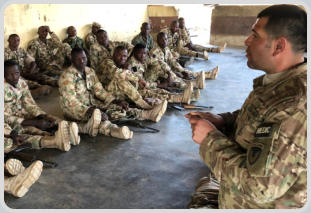
By: Abi Watson
Few
countries
have
been
unaffected
by
the
attacks
of
9/11
and
the
Global
War
on
Terror
(GWOT)
that
followed.
But
with
the
coming
of
age
of
a
new
generation
not
witness
to
the
vio
-
lence directly, and the emergence (…)
From the War on Terror to the
War Against “Islamism”: France
in the post-9/11 Era

By: Dr. Alain Gabon
A
few
weeks
after
the
9/11
attacks,
NATO
invoked
Article
5,
leading
to
Türkiye’s
participation
in
NATO
mis
-
sions
in
Afghanistan,
such
as
running
the
Kabul
International
Airport
and
assuming leadership of ISAF (…)
Türkiye-U.S. Relations After
9/11: From Strategic
Partnership to Strategic
Divergence

By: Gökhan Tekir
By: Rodrigo Augusto Duarte Amaral,
Mariana Medeiros Bernussi,
Victória Wood Farinelli
The Brazilian Antiterrorism Law:
The U.S. Counterterrorism
Agenda, International Economic
Pressures, and Socio-Political
Conveniences.

One
of
the
legacies
of
September
11th
was
the
imperative
to
develop
locally
stricter
counterterrorism
measures,
even
in
countries
historically (…)
By: Safiyya Hosein
More than Just Spandex:
American Muslim Superheroes
and the Global War on Terror
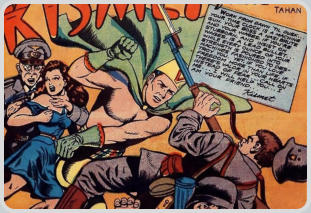
Even
though
Muslim
superheroes
have
appeared
in
American
comic
books
since
the
1940s,
their
number
grew steadily in the post-9/11 (…)
Since
the
Taliban
recaptured
Afghanistan
in
August
2021,
the
Afghan
diaspora
in
the
Global
North
has
been
under
general
suspicion.
This
is
particularly
true
in
Germany,
which
currently
hosts
the
largest
Afghan diaspora community (…)
All Taliban are Pashtuns and all
Pashtuns are Taliban?!
A Contribution to Differentiation
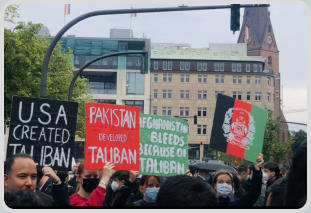
By: Muska Haqiqat
The
events
of
9/11
left
a
dark
legacy
on
Jordanian
politics.
As
the
Hashemite
Kingdom
became
imbricated
in
the
U.S.-led
War
on
Terror
and,
more
broadly,
Washington’s
hegemonic
march
across
the
Middle
East,
authoritarian
governance at home became (…)
By: Sean Yom
Jordan:
Deepening Authoritarianism

By: Rebecca Ruth Gould
Everyday Martyrs in the Gaza
Genocide

As
of
July
2024,
over
37,000
Palestinians
have
been
killed
in
the
Gaza
genocide
as
a
result
of
Israeli
attacks
and
the
denial
of
water,
food,
and
medical
aid
to
Gaza.
At
least
15,000
of
these
martyrs
are
children.
Over 87,000 are (…)
By: Tiina Hyyppä, Agneta Kallström
From Healthcare Professional to
Terrorist: : Anti-Terrorism
Legislation during the Syrian Civil
War

Ever
since
the
United
States
launched
the
War
on
Terror
in
the
early
2000s,
interpretation
of
anti-terrorism
legislation
in
the
West
extended
to
encompass
civilian
endeavors,
comprising (…)
The
state
of
emergency
that
was
trig
-
gered
by
the
launch
of
the
War
on
Terror
has
had
enduring
repercus
-
sions
for
the
legal
sphere,
both
inter
-
nationally
and
within
domestic
jurisdictions.
The
“War”
was
set
into
motion not just with (…)
Counter-terrorism Laws and
Criminal Justice:
the Legacies of Colonial Legality

By: Sonia Qadir
By: Abu Jenin
In this Genocide: Self-
Subtracting Humanity and
Signification in the U.S.
Academy

Since
the
launch
of
Al-Aqsa
Flood
on
October
7,
2023,
those
few
in
the
United
States
that
have
spoken
out
against
seventy
years
of
apartheid, genocide, and
(…)
© 2023-2024 Oriental Institute, The Czech Academy of Sciences, Kevin L. Schwartz, and Ameem Lutfi


If you are interested in contributing an article for
the project, please send a short summary of the
proposed topic (no more than 200 words) and brief
bio to submissions@911legacies.com. For all
other matters, please contact
inquiry@911legacies.com.

CONTACT
Semantics and the
Language of Terror
Counterinsurgency Strategies
Knowledge and
Cultural Production
Capital Flows and
Patronage Networks
Islamism and
Internationalism
Rise
of Authoritarianism
MUSLIM NETWORKS
Counterinsurgency Strategies
KNOWLEDGE AND CULTURAL PRODUCTION
CAPITAL FLOWS AND PATRONAGE NETWORKS
RISE OF AUTHORITARIANISM
SEMANTICS AND THE LANGUAGE OF TERROR
ISLAMISM AND INTERNATIONALISM
Muslim Networks


























































© 2023-2024 Oriental Institute, The Czech Academy of
Sciences, Kevin L. Schwartz, and Ameem Lutfi

THEMATICS
After
he
stopped
being
a
mujahid
during
the
Soviet-Afghan
War
but
be
-
fore
becoming
the
most
wanted
ter
-
rorist
after
the
9/11
attacks,
Osama
Bin
Laden
detoured
through
the
Balkans.
He
traveled
to
Albania,
built
an
alliance
with
the
mujahideen
in
the Bosnian War (…)
Islamic Radicalism in the Balkans:
From Immigrant Arab Fighters to
Emigrant Combatant in Arabia
By: Julian Schmid
The “War on Terror” Did Not Take
Place: “9/11,” Ahistoricity, and the
Infinite Apocalypse
By: Jan Daniel
Myopic Visions of the War on
Terror Era: Lebanon as a Post-9/11
Security Problem
The
events
of
9/11
and
the
subsequent
Global
War
on
Terrorism
have
profoundly
transformed
the
landscape
of
international
development
in
post-Soviet
Central
Asia.
The
launching
of
the
military
campaign,
Operation
Enduring
Freedom,
in
neighboring
Afghanistan
in October 2001 resulted in
By:
Clément Steuer
How 9/11 Reshaped the
International Development
Scene in Central Asia
US Pressure for
Democratization, and Egyptian
Political Opportunity Structure
since 9/11




The
terrorist
attacks
of
9/11
drastically
impacted
the
lives
of
Uyghurs
and
other
Muslims
in
China’s
Xinjiang
region.
But
while
the
ensuing
Global
War
on
Terror
and
worldwide
Islamophobia
has
likely
been
a
contributing
factor
to
China’s
repression (…)
By: Ondřej Klimeš and Sam Tynen
Assimilation or Islamophobia?:
Uyghurs and China’s
Counter–Terrorist Discourse
after 2001

The
terrorist
attacks
of
9/11
on
American
soil
altered
not
only
the
international
security
environment
but
also
the
domestic
power
equilibrium
in
several
Southeast
Asian
countries.
The
incumbent
Malaysian (…)
Keeping Watch: Islamism in
Indonesia after 9/11 and the
Bali Bombing of 2002

By: Tomáš Petrů
At
the
very
outset
of
the
21st
century,
Osama
bin
Laden
positioned
himself,
wittingly
or
unwittingly,
with
the
9/11
attacks,
as
one
of
its
likely
most
important
figures.
The
attacks
initially
served
to
undermine
multicultural
policies
in
relatively
ethnically and religiously (…)
Bin Laden’s Legacy Probably
Surpasses His Wildest Dreams

By: James M. Dorsey
By: Karolina Kluczewska

With
the
20th
anniversary
of
the
September
11th
attacks
upon
us,
it
is
important
to
recall
that
millions
of
Arab
and
Muslim
Americans,
who
had
nothing
to
do
with
those
attacks,
suffered
enormous
civil
rights
violations,
physical
attacks,
job
losses
(…)
By: Louise Cainkar
Surveillance Spotlight on Arab
and Muslim Americans: An
Enduring Legacy of the Global War
on Terror

By: Asya Metodieva
When
al-Qaeda
framed
the
9/11
attacks
as
an
Islamic
holy
war
(jihad)
and
the
United
States
retaliated
by
invading
Afghanistan
(2001)
and
Iraq
(2003)
and
initiating
a
Global
War
on
Terror,
Samuel
Huntington’s
clash
of
civilizations
thesis
between
"Islam"
and "the West" gained currency (…)
The Rise and Fall of Moderate
Islamism as a Political Project:
The Legacy of 9/11 in
Turkey’s Relations with the West

By: Pelin Ayan Musil
The Evolution of Armed Drones
for Targeted Killing after 9/11

From
Yemen
to
Libya,
Syria,
and
Nagorno-Karabakh,
armed
drones
delivering
precision
munitions
or
commercial
drones
re-engineered
into
flying
bombs
by
insurgents
are
changing
the
security
landscape.
The
Middle (…)
By: Alessandro Arduino
For
the
past
twenty
years,
the
September
11
attacks
have
been
seen
by
American
and
international
policymakers
and
populations
alike
as
a
breaking
point
of
international
poli
-
tics and security. After the (…)
Following
the
9/11
attacks,
the
Bush
administration
launched
the
U.S.
and
its
allies
into
a
“Global
War
on
Terror,”
designed
and
inspired
by
a
neo-conservative
worldview.
The
purpose of the (…)
The
Global
War
on
Terror
(GWOT)
defined
Western
engagement
with
many
places
in
the
Global
South
over
the
last
two
decades.
Trying
to
deal
with elusive terrorist (…)
By:
Daniel R. Mahanty
The Sorcerer’s Apprentice:
U.S. Security Assistance after
9/11

Few
images
better
reflect
America’s
response
to
the
attacks
of
9/11
as
well
as
Goethe’s
The
Sorcerer’s
Apprentice.
Charged
with
mopping
the floor, and eager (…)
The
Global
War
on
Terror
(GWOT)
reshaped
one
of
the
most
consequential
intra-Islamic
conflicts
of
our
time,
namely
Sunni-Shi‘i
sectarianism.
While
the
20th
century
had
witnessed
some
sincere
efforts
to
bridge
the
gaps
between
the
communities, it became (…)
Bold Shi'is, Frightened Sunnis, and
the Making of Sectarianism after
9/11

By: Simon Wolfgang Fuchs
After
it
was
revealed
that
seventeen
of
the
nineteen
9/11
hijackers
hailed
from
the
Gulf
(fifteen
were
Saudi
citizens,
two
were
Emiratis),
the
states
of
the
Gulf
Cooperation
Council
(GCC)
doubled
down
on
rhetoric
about
the
need
to
combat
radical
and
militant
Islam.
Washington also (…)
9/11 and the Securitization of
Political Islam in the Gulf

By: Courtney Freer
On
a
hillside
about
an
hour
outside
of
Kathmandu
sits
a
collection
of
well-
built,
freshly
painted
houses.
The
development
is
not
in
a
particularly
wealthy
area,
but
houses
men
who
have
made
their
money
by
spending
(…)
How the “Forever Wars” Reshape
Himalayan Villages

By: Noah Coburn
By: Olmo Gölz
Productive Discomfort: German
Islamic Studies after 9/11

The
events
of
9/11
shook
up
Islamic
Studies
(‘Islamwissenschaft’)
in
the
German-language
academy
(including
Switzerland
and
Austria)
and
left
a
deep
imprint
on
the
discipline (…)
Afghanistan
was
already
in
the
back
of
my
mind,
on
the
morning
of
September
11,
2001:
I
was
supposed
to
be
there.
As
I
walked
to
my
office
on
a
crystal-clear
Fall
day,
I
was
thinking
about
my
cancelled
visit.
I
barely
noticed
the
plume
of
smoke
from across the (…)
The Global War on Terror and
U.S. Relations with the Muslim
World: Reflections on
Afghanistan

By: Jonah Blank
War and State (Un)making in
Tribal Borderlands of Pakistan

In
August
this
year,
three
soldiers
from
the
gendarmerie
Balochistan
Levy
Force
were
killed
in
a
landmine
explosion
in
Ziarat,
a
southwestern
town
of
Pakistan.
A
parlat
(sit-in)
ensued
as
the
deceased's
relatives
and well-wishers refused (…)
By: Saifullah Nasar
In
1991,
the
Soviet
Republics
of
Central
Asia
—
including
Kazakhstan,
Kyrgyzstan,
Uzbekistan,
Tajikistan,
and
Turkmenistan
—
suddenly
and
unexpectedly
gained
independence
from
the
Soviet
Union.
The
international
community,
however,
paid little (…)
By: Tim Epkenhans
Post-Soviet Central Asia after
9/11: The Global War on Terror,
Authoritarian Consolidation,
and Religious Revival

Before
the
9/11
tragedy
struck
American
soil,
U.S.
facilities
in
the
Persian
Gulf
region
were
placed
on
a
heightened
state
of
alert,
as
U.S.
au
-
thorities
were
informed
that
“American
citizens
abroad
may
be
tar
-
geted
by
extremist
groups
with
links
to bin Laden’s organisation (…)
How the Sands Have Shifted:
Reflections on 9/11 as a Chapter
in U.S.-Gulf Relations
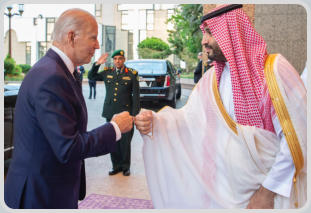
By: Clemens Chay
Days
before
the
U.S.-led
forces
in
-
vaded
Afghanistan
to
avenge
the
at
-
tacks
on
9/11,
President
George
W.
Bush
outlined
his
approach
to
the
Global
War
on
Terror
(GWOT):
“Our
war
on
terror
begins
with
al-Qaeda,
but
it
does
not
end
there.”
What
fol
-
lowed was a worldwide (…)
Iran’s Exclusion and Lost
Opportunities in the U.S.-Led
Global War on Terror
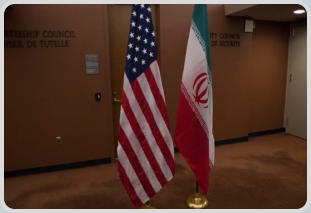
By: Asif Shuja
By: Elena Fellner
Redefining Terrorism: Iran, the
U.S., and the War on Terror

Mohammad
Javad
Zarif
likes
to
lecture.
That
much
is
obvious
to
anyone
who
has
ever
read
more
than
a
handful
of
tweets
by
Iran’s
previous
foreign
minister
(2013-2021),
and
it
is
especially striking (…)
By: Angeliki Coletsou
Visual Representations of Iran
in Western Media after 9/11

The
year
2001
has
been
considered
a
turning
point
in
the
rapid
increase
of
Islamophobia
and
Islamophobic
de
-
pictions
in
Western
media,
especially
concerning Arab and Muslim (…)
Departing
from
the
general
trend
in
scholarly
inquiries
and
popular
inves
-
tigations
of
the
post-9/11
era
that
focus
on
the
political,
legal,
religious,
and
social
positionality
of
Muslims
vis-à-vis
the
West,
political
institu
-
tions in their home (…)
9/11 and Sectarianism in Islam;
Counter-Terrorism Debates
among Muslim Groups of Kerala,
India

By: M Sihabudheen Kolakkattil
Since
the
Taliban
recaptured
Afghanistan
in
August
2021,
the
Afghan
diaspora
in
the
Global
North
has
been
under
general
suspicion.
This
is
particularly
true
in
Germany,
which
currently
hosts
the
largest
Afghan diaspora community (…)
All Taliban are Pashtuns and all
Pashtuns are Taliban?!
A Contribution to Differentiation

By: Muska Haqiqat
America Won the War on Terror,
and Everyone is Worse Off

American
elites
talk
about
the
War
on
Terror
as
a
failure.
Whether
their
diagnosis
was
an
overabundance
of
compassion
or
brutality,
goals
that
were
too
ambitious
or
too
limited,
the
U.S.
political
class
tends
to
see
their country’s twenty-year (…)
By: Matthew Petti
From Horse Soldiers to Hybrid
Conflicts: Unconventional
Warfare’s Evolution since 9/11

The
stark
contrast
of
the
beginning
and
end
of
U.S.
military
operations
in
Afghanistan
forces
a
reflection
on
the
trajectory
of
unconventional
warfare
over
two
decades
of
the
Global
War
on Terror. The early (…)
By: Alp Yenen
By: Angeliki Coletsou
Visual Representations of Iran
in Western Media after 9/11

The
year
2001
has
been
considered
a
turning
point
in
the
rapid
increase
of
Islamophobia
and
Islamophobic
de
-
pictions
in
Western
media,
especially
concerning Arab and Muslim (…)
By: Safiyya Hosein
More than Just Spandex:
American Muslim Superheroes
and the Global War on Terror

Even
though
Muslim
superheroes
have
appeared
in
American
comic
books
since
the
1940s,
their
number
grew steadily in the post-9/11 (…)
Discussions
on
the
role
played
by
regional
connectivity
in
the
economic
development
of
countries
along
the
so-called
“Silk
Road”
reached
a
fever
pitch
during
the
twenty
year
Global
War
on
Terror
(GWOT).
The
same
period, however (…)
The Global War on Terror and the
Transformation of Afghanistan’s
Commercial Networks

By: Magnus Marsden
Policy
discussions
around
counter-
terrorism
efforts
now
state
a
difficult
lesson
learned
of
international
intervention
so
common
that
it
has
become
a
trope:
tactical
fixes
don’t
fix
political
problems.
You
cannot
(…)
The Two Most Dangerous Self-
Deceptions in Security Sector
Reform

By: Abi Watson
By: Rodrigo Augusto Duarte Amaral,
Mariana Medeiros Bernussi,
Victória Wood Farinelli
The Brazilian Antiterrorism Law:
The U.S. Counterterrorism
Agenda, International Economic
Pressures, and Socio-Political
Conveniences.
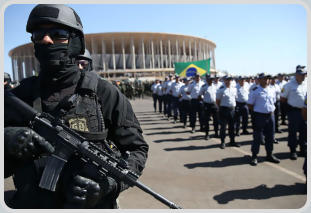
One
of
the
legacies
of
September
11th
was
the
imperative
to
develop
locally
stricter
counterterrorism
measures,
even
in
countries
historically (…)
Few
countries
have
been
unaffected
by
the
attacks
of
9/11
and
the
Global
War
on
Terror
(GWOT)
that
followed.
But
with
the
coming
of
age
of
a
new
generation
not
witness
to
the
vio
-
lence directly, and the emergence (…)
From the War on Terror to the
War Against “Islamism”: France
in the post-9/11 Era

By: Dr. Alain Gabon
A
few
weeks
after
the
9/11
attacks,
NATO
invoked
Article
5,
leading
to
Türkiye’s
participation
in
NATO
mis
-
sions
in
Afghanistan,
such
as
running
the
Kabul
International
Airport
and
assuming leadership of ISAF (…)
Türkiye-U.S. Relations After
9/11: From Strategic
Partnership to Strategic
Divergence
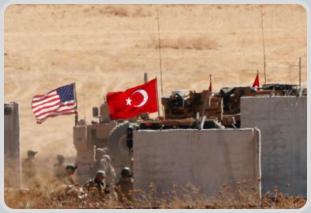
By: Gökhan Tekir
The
events
of
9/11
left
a
dark
legacy
on
Jordanian
politics.
As
the
Hashemite
Kingdom
became
imbricated
in
the
U.S.-led
War
on
Terror
and,
more
broadly,
Washington’s
hegemonic
march
across
the
Middle
East,
authoritarian
governance at home became (…)
By: Sean Yom
Jordan:
Deepening Authoritarianism

By: Rebecca Ruth Gould
Everyday Martyrs in the Gaza
Genocide

As
of
July
2024,
over
37,000
Palestinians
have
been
killed
in
the
Gaza
genocide
as
a
result
of
Israeli
attacks
and
the
denial
of
water,
food,
and
medical
aid
to
Gaza.
At
least
15,000
of
these
martyrs
are
children.
Over 87,000 are (…)
By: Tiina Hyyppä, Agneta Kallström
From Healthcare Professional to
Terrorist: : Anti-Terrorism
Legislation during the Syrian Civil
War

Ever
since
the
United
States
launched
the
War
on
Terror
in
the
early
2000s,
interpretation
of
anti-terrorism
legislation
in
the
West
extended
to
encompass
civilian
endeavors,
comprising (…)
The
state
of
emergency
that
was
trig
-
gered
by
the
launch
of
the
War
on
Terror
has
had
enduring
repercus
-
sions
for
the
legal
sphere,
both
inter
-
nationally
and
within
domestic
jurisdictions.
The
“War”
was
set
into
motion not just with (…)
Counter-terrorism Laws and
Criminal Justice:
the Legacies of Colonial Legality

By: Abu Jenin
In this Genocide: Self-
Subtracting Humanity and
Signification in the U.S.
Academy

Since
the
launch
of
Al-Aqsa
Flood
on
October
7,
2023,
those
few
in
the
United
States
that
have
spoken
out
against
seventy
years
of
apartheid, genocide, and
(…)







Semantics and the
Language of Terror
Counterinsurgency Strategies
Knowledge and
Cultural Production
Capital Flows and
Patronage Networks
Islamism and
Internationalism
Rise
of Authoritarianism
Muslim Networks

If you are interested in contributing an article for the
project, please send a short summary of the proposed
topic (no more than 200 words) and brief bio to
submissions@911legacies.com. For all other
matters, please contact inquiry@911legacies.com.

CONTACT

MUSLIM NETWORKS
Counterinsurgency
Strategies
KNOWLEDGE AND
CULTURAL PRODUCTION
CAPITAL FLOWS AND
PATRONAGE NETWORKS
RISE OF
AUTHORITARIANISM
SEMANTICS AND THE
LANGUAGE OF TERROR
ISLAMISM AND
INTERNATIONALISM






















































